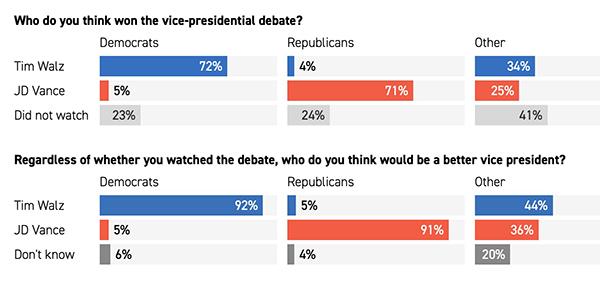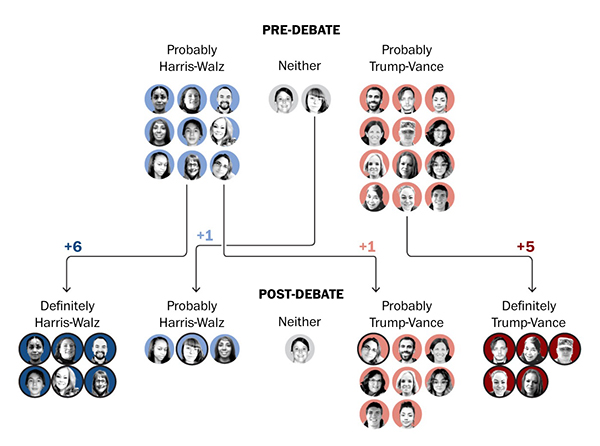

Politico commissioned Focaldata to run a snap poll after the vice presidential debate. Here are the results:

Look at the partisanship. Among all voters, it was a tie, 50-50. Among Democrats who watched the debate, 94% said Gov. Tim Walz (DFL-MN) won. Among Republicans who watched, 95% said Sen. J.D. Vance (R-OH) won. Among independents who watched, 55% said Walz won. In other words, nearly all Democrats think their guy won and nearly all Republicans think their guy won. Were they watching the same debate? The good news for the blue team is that independents had a slight preference for Walz, although the effect of the debate is likely to be minimal. But it does show how strong partisanship is. It overrides everything else.
The crosstabs are not surprising. Walz did best with younger voters, those with college degrees, and minority voters. Vance did best with voters over 55 and those without a college degree.
In the end, the real winner may be Vance because he has historically bad approval ratings and during the debate, he seemed prepared, competent, and not so weird. For voters who know little about him but have heard that he is weird, seeing him act like a normal politician and not so weird can't help but improve his approval rating. Although we will have to wait for new approval ratings, one bit of evidence suggests that Vance did what he had to do. Among people who did not watch the debate, only 34% said Vance would be ready to sit in the Big Chair if it became empty during his vice presidency, vs. 43% who said he would not be ready. Among people who did see the debate, the numbers were reversed, with 51% saying he was ready and 38% saying he was not ready. So Vance went from "not ready to be president" to "sort of ready to be president." That was his mission and he accomplished it.
For Walz, readiness is less of an issue since Kamala Harris is nearly two decades younger than Donald Trump. So the chance that the veep will need to take over is much smaller for the Minnesotan. Still, among nonwatchers, 36% think he would be ready to take over vs. 41% who think he would not be ready. Among people who watched the debate, 48% said he would be ready vs. 42% who said he would not be. Again, partisanship drives everything, but on the whole, it seems both candidates improved their images, probably because many people simply didn't know much about them.
The Washington Post did it differently. Instead of commissioning a snap poll, they ran a focus group of 23 undecided voters of all ages from around the country. Prior to the debate, nine were probably going to vote for Harris/Walz, 12 were probably going to vote for Trump/Vance, and two were genuinely undecided. This was already an error on the part of the Post; they should have chosen as many Harris leaners as Trump leaners for their panel. Surely they could have found three more undecided voters leaning towards Harris/Walz if they tried harder.
Interestingly enough, after the debate, one of the Harris leaners became a Trump/Vance leaner but one of the undecideds leaned toward Harris/Walz, so Harris/Walz still had nine fans after the debate. None of the Trump/Vance leaners jumped ship, but the one person who switched teams raised their total from 12 to 13. Here is the situation graphically:

Noteworthy is that 11 of the 23 members of the group finally made up their minds definitively after the debate. Were they waiting to see the veeps before making a decision? For the Trump leaners, this is plausible because, given his age and lifestyle, there is a nontrivial chance the #2 guy might end up as the #1 guy, so they wanted to check out #2. For the Harris leaners, this is less likely. Nevertheless, Walz convinced two-thirds of them to say: "Yup, it's Harris for me." One of the undecideds still couldn't make up her mind. What is she waiting for? For James Comey to announce he found even more e-mails?
A question the Post asked of all the participants was: "Do you agree with Walz that Trump tried to overturn the 2020 election?" Three people strongly disagreed, four somewhat disagreed, four were neutral, five somewhat agreed, and seven strongly agreed. Who won? Looks like "alternative facts" won.
On healthcare and school shootings, small majorities think Walz did better, but on abortion it was lopsided. When asked: "Do you agree with Vance that abortion policy should be left to the states?" nine women and two men strongly disagreed and four more women somewhat disagreed. Two men and one woman were neutral. One woman agreed somewhat. Two women and one man strongly agreed. Maybe the Post should have put equal numbers of men and women on the panel? On the other hand, if additional men have the same opinion as Aaron (35) of Pennsylvania, maybe not. He said: "I'm not sure what I think about abortion policy being left up to the states." Thank you, Aaron, for your incredible insight.
On immigration and climate change, small majorities said Vance did better. However, most people are not good at separating their views on a subject, and how someone answered the question. One can believe that climate change is real and the most pressing problem for the country and also believe that Walz botched his answer.
When asked if they would support a preemptive strike by Israel on Iran, all the men and 11 women were for a preemptive strike while six women were not.
April (26) from Arizona may have summed up what she wanted from the debate by saying: "I'm interested in seeing how much they lie or exaggerate, how well they treat each other, and if they come across as real people." (V)